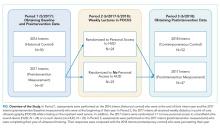Portable Ultrasound Device Usage and Learning Outcomes Among Internal Medicine Trainees: A Parallel-Group Randomized Trial
BACKGROUND: Little is known about how to effectively train residents with point-of-care ultrasonography (POCUS) despite increasing usage.
OBJECTIVE: This study aimed to assess whether handheld ultrasound devices (HUDs), alongside a year-long lecture series, improved trainee image interpretation skills with POCUS.
METHODS: Internal medicine intern physicians (N = 149) at a single academic institution from 2016 to 2018 participated in the study. The 2017 interns (n = 47) were randomized 1:1 to receive personal HUDs (n = 24) for patient care vs no-HUDs (n = 23). All 2017 interns received a repeated lecture series regarding cardiac, thoracic, and abdominal POCUS. Interns were assessed on their ability to interpret POCUS images of normal/abnormal findings. The primary outcome was the difference in end-of-the-year assessment scores between interns randomized to receive HUDs vs not. Secondary outcomes included trainee scores after repeating lectures and confidence with POCUS. Intern scores were also compared with historical (2016, N = 50) and contemporaneous (2018, N = 52) controls who received no lectures.
RESULTS: Interns randomized to HUDs did not have significantly higher image interpretation scores (median HUD score: 0.84 vs no-HUD score: 0.84; P = .86). However, HUD interns felt more confident in their abilities. The 2017 cohort had higher scores (median 0.84), compared with the 2016 historical control (median 0.71; P = .001) and 2018 contemporaneous control (median 0.48; P < .001). Assessment scores improved after first-time exposure to the lecture series, while repeated lectures did not improve scores.
CONCLUSIONS: Despite feeling more confident, personalized HUDs did not improve interns’ POCUS-related knowledge or interpretive ability. Repeated lecture exposure without further opportunities for deliberate practice may not be beneficial for mastering POCUS.
© 2020 Society of Hospital Medicine
Point-of-care ultrasonography (POCUS) can transform healthcare delivery through its diagnostic and therapeutic expediency.1 POCUS has been shown to bolster diagnostic accuracy, reduce procedural complications, decrease inpatient length of stay, and improve patient satisfaction by encouraging the physician to be present at the bedside.2-8
POCUS has become widespread across a variety of clinical settings as more investigations have demonstrated its positive impact on patient care.1,9-12 This includes the use of POCUS by trainees, who are now utilizing this technology as part of their assessments of patients.13,14 However, trainees may be performing these examinations with minimal oversight, and outside of emergency medicine, there are few guidelines on how to effectively teach POCUS or measure competency.13,14 While POCUS is rapidly becoming a part of inpatient care, teaching physicians may have little experience in ultrasound or the expertise to adequately supervise trainees.14 There is a growing need to study what trainees can learn and how this knowledge is acquired.
Previous investigations have demonstrated that inexperienced users can be taught to use POCUS to identify a variety of pathological states.2,3,15-23 Most of these curricula used a single lecture series as their pedagogical vehicle, and they variably included junior medical trainees. More importantly, the investigations did not explore whether personal access to handheld ultrasound devices (HUDs) improved learning. In theory, improved access to POCUS devices increases opportunities for authentic and deliberate practice, which may be needed to improve trainee skill with POCUS beyond the classroom setting.14
This study aimed to address several ongoing gaps in knowledge related to learning POCUS. First, we hypothesized that personal HUD access would improve trainees’ POCUS-related knowledge and interpretive ability as a result of increased practice opportunities. Second, we hypothesized that trainees who receive personal access to HUDs would be more likely to perform POCUS examinations and feel more confident in their interpretations. Finally, we hypothesized that repeated exposure to POCUS-related lectures would result in greater improvements in knowledge as compared with a single lecture series.
METHODS
Participants and Setting
The 2017 intern class (n = 47) at an academic internal medicine residency program participated in the study. Control data were obtained from the 2016 intern class (historical control; n = 50) and the 2018 intern class (contemporaneous control; n = 52). The Stanford University Institutional Review Board approved this study.
Study Design
The 2017 intern class (n = 47) received POCUS didactics from June 2017 to June 2018. To evaluate if increased access to HUDs improved learning outcomes, the 2017 interns were randomized 1:1 to receive their own personal HUD that could be used for patient care and/or self-directed learning (n = 24) vs no-HUD (n = 23; Figure). Learning outcomes were assessed over the course of 1 year (see “Outcomes” below) and were compared with the 2016 and 2018 controls. The 2016 intern class had completed a year of training but had not received formalized POCUS didactics (historical control), whereas the 2018 intern class was assessed at the beginning of their year (contemporaneous control; Figure). In order to make comparisons based on intern experience, baseline data for the 2017 intern class were compared with the 2018 intern class, whereas end-of-study data for 2017 interns were compared with 2016 interns.







